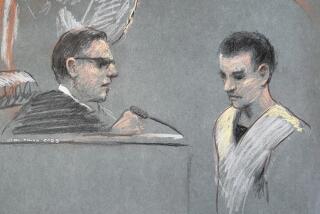Weinberger Defends Anti-Spying Efforts : Recent Cases Do Not Reflect ‘a Letting Down of the Guard,’ He Says
- Share via
WASHINGTON — Defense Secretary Caspar W. Weinberger said Thursday that the recent spate of espionage and weapons theft cases “concerns me very much” but “I don’t think they represent a letting down of the guard.”
Weinberger told a luncheon meeting with reporters: “The fact that these things are surfacing can be attributed perhaps to greater enforcement efforts.”
He added: “All of them are reprehensible,” but “sadly, you are going to have spies and thieves no matter what we do.”
His comments came as the first of the Walker family espionage trials moved through its fourth day in Norfolk, Va. Closing arguments are scheduled for today in the case of Arthur J. Walker, a retired Navy lieutenant commander accused of giving confidential military documents to his brother for relay to Soviet agents.
Since the Walker family spy case surfaced last spring, the government has announced two sets of indictments involving other military personnel.
In San Diego, a Navy storekeeper aboard the aircraft carrier Kitty Hawk was among those accused of stealing spare parts for sophisticated weapons systems and selling them to Iranian agents. And in Florida, a Pentagon-based Army lieutenant colonel was indicted for allegedly joining in a foiled conspiracy to sell thousands of missiles to operatives for Ayatollah Ruhollah Khomeini’s regime.
Responding to questions, Weinberger said that the cases are related “only in the sense that they may be motivated by common greed.” The Walker case, he said, involves “the selling of secrets of the United States” and represents “a serious loss” because it had been “going on for 20 years.” The other cases, he added, seem to be attempts “to make money by illegal acts.”
“All of them are reprehensible--the espionage is more reprehensible,” he said. “. . . Certainly, these are all very unhappy events, but I don’t think they represent any letting down of the guard or anything like that. I think it is fortunate they are being caught when they are. Obviously, you try to learn lessons from each one of these things.”
Asked what lessons have been learned, the Pentagon chief replied: “That we ought to be as careful as we can in the number of (security) clearances and in the people who have access” to secrets.
“I don’t have any illusion that that is going to cure the problem, but it narrows the target; it reduces the number of people who might be tempted,” he said.
More to Read
Sign up for Essential California
The most important California stories and recommendations in your inbox every morning.
You may occasionally receive promotional content from the Los Angeles Times.













